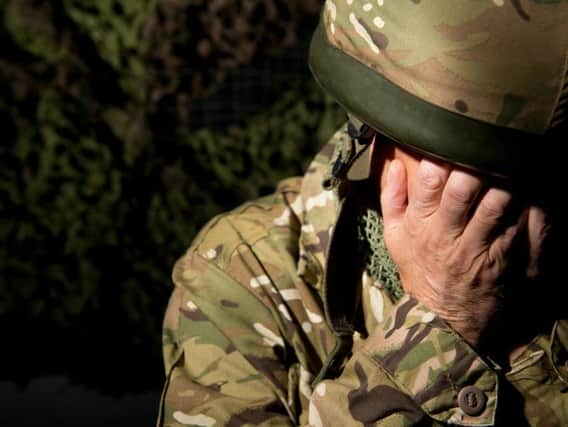Government urged to prevent future 'epidemic' of veterans with Post Traumatic Stress Disorder


An investigation on behalf of Johnston Press, the Echo’s parent company, has found no comprehensive official records are kept for the number of British ex-servicemen and women ending their lives.
Coroners, for instance, are not obliged to flag up a person’s military past if they kill themselves in later life.
Advertisement
Hide AdAdvertisement
Hide AdThis is in stark contrast to allies such as America and Australia where official figures do exist.
In the United States, veteran suicide rates have increased by nearly 20 per cent since the onset of lengthy military campaigns in Iraq and Afghanistan.
Our research suggests that in this country coroners are investigating an average of one suspected veteran suicide every 11 days in 2018.
This compares to an average of one personnel death every 14 days due to enemy action in Iraq and Afghanistan between 2001-14.
Advertisement
Hide AdAdvertisement
Hide AdWhile the Ministry of Defence (MoD) insists Armed Forces suicides here are “significantly lower” than the eight per cent nationwide average, a leading clinician at veterans’ charity Combat Stress insists the Government is relying on data nearly a decade old and needs to do more to analyse the problem.
Support groups here in Sunderland and politicians have also called for tighter records and more help generally for veterans.
Ger Fowler, founder of Veterans in Crisis Sunderland (VICs), who once considered taking his own life while he struggled with Post Traumatic Stress Disorder (PTSD), said: “How can we understand the extent of the problem unless we have the figures in front of us?
“Someone somewhere needs to do something. We have university research which shows that lads coming out of the forces who are not talking about their problems for 18 years.
Advertisement
Hide AdAdvertisement
Hide Ad“Don’t get me wrong, the Armed Forces are helping more than they did when I left in the 1990s.
“But we could have an epidemic of people struggling with their mental health unless even more is done.”
A former head of the Royal Navy expressed his surprise at the lack of suicide records.
Admiral Lord West, who is now a Labour peer, said: “I’m very surprised there’s no kind of record of suicide from mental illness that stems from their time in the military. I think it would make absolute sense to do that.”
Advertisement
Hide AdAdvertisement
Hide AdFigures from Combat Stress, which is currently treating more than 3,000 veterans, show that 19 per cent of them have had moderate to severe suicidal thoughts.
Dr Dominic Murphy, from the charity, said: “From the mid-noughties onwards there has been a higher rate of suicide among American, Canadian and Australian veterans and some of our European allies and we just don’t know the situation in the UK because the last study was in 2009.
An MoD spokesperson said: “While rates of suicide are significantly lower in the Armed Forces than the general population, any suicide is a tragedy for the individual, their family, friends and colleagues and we take each case extremely seriously.
Advertisement
Hide AdAdvertisement
Hide Ad“The reasons people take their lives can vary and are not necessarily linked to their service. Help is available for serving personnel, their families and veterans, including through the two 24-hour mental health helplines provided by Combat Stress.”
Among measures launched in the last 18 months is an online Veterans’ Gateway to streamline access to help and a tailored NHS service to help personnel leaving the armed services.
A Veterans’ ID card to allow ex-servicemen and women identify themselves and access services is also in the pipeline.